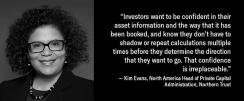Investors’ increased interest in alternative assets has driven steady growth in private capital markets, which in turn has spurred fertile private secondary markets as well. In 2018, private secondaries traded about $74 billion, compared with approximately $20 billion in 2010, according to analysis by investment bank Greenhill & Co. Once home to almost exclusively distressed selling that often signaled the end of a relationship between a LP and a GP, today only a small fraction of secondaries are distressed sell-offs.
In tandem with the growth in private and private secondary markets, the traditional strategy of “buy and hold” (derived from the view of such assets as illiquid) has given way to a necessity to actively manage private market portfolios as if they were in liquid portfolios. The result is increasingly complex transactions that require skills and technology that are often beyond what transaction participants readily have at hand.
“The main source of complexity around secondaries is the illiquidity of the assets,” says Kim Evans, North America Head of Private Capital Administration at Northern Trust. “For a LP or a GP, the illiquidity makes it more difficult to transact in the secondary market because it may be unclear where the exit points are. Determining when and how you can successfully execute a transaction is critical, so having accurate and timely access to all the data – commitments, contributions, distributions – is crucial to enable decision-making from a capital standpoint and a GP, LP, and fund perspective.”

Talent also a necessary resource
Along with core accounting excellence and spot-on reporting and analytics, the people behind the process are critical. The knowledge and expertise needed to efficiently execute a secondary transaction isn’t always readily available in-house at a GP or LP, but that talent is vital to ensuring that the proper reporting, accounting, and follow-up capital accounting is embedded in the transaction. This is especially true during the exploratory phase of a secondary transaction.
“From the outset, you want to look at the transaction from all the different angles,” Evans says. “The reporting element is about being certain you have people who understand the information you need and who can quickly present it through different filters or perspectives. This allows you to efficiently conduct your due diligence, and once that’s accomplished, to execute your transactions.”
The analysis needed prior to investing in a secondary market transaction is greatly aided by a nimble, flexible, and highly knowledgeable partner equipped with the right technological tools and automation. That’s what makes Northern Trust the go-to partner for secondary transactions.
“Investors want to be confident in their asset information and the way that it has been booked, and know they don’t have to shadow or repeat calculations multiple times before they determine the direction that they want to go,” says Evans. “That confidence is irreplaceable, and it comes from strong performance and execution over time when we’re building relationships with our clients.”
Technology and scale underpin efficient secondary transactions
GPs and LPs who work with Northern Trust are the beneficiaries of sophisticated data analytics and reporting tools that provide the desired transparency into both the investor level reporting and the performance reporting that’s required for the assets themselves. Those two layers – core accounting, and reporting and analytics – are an offering that’s a differentiator for Northern Trust.
From a fund administration perspective, Northern Trust’s platform leverages an array of applications that automate the core accounting, making countless spreadsheets a thing of the past. Northern Trust’s solutions are easier and more cost efficient to tap into for GPs and LPs who otherwise would carry the burden of constantly keeping up with evolving technology. And with experience servicing both GPs and LPs, clients investing in secondary markets can be assured that they are working with a provider that understands both sides of the transaction.
“Our clients don’t need to invest in a separate set of technologies to access the robust accounting or the data analytics and reporting we provide,” says Evans. “That’s something that we do for them holistically. For all parties in the chain of a secondary transaction, we understand what they need and have the tools to help them maximize their strategies.”
This holistic solution and expertise is crucial for secondary market transactions. For example, suppose that for governance and policy purposes, a large institutional investor is overallocated in a particular alternative strategy. To decrease their allocation, they may work either directly with the GP and/or with an intermediary to perform a secondary transaction.
When notified by the alternative asset manager of such a situation, the team at Northern Trust can seamlessly support the exit side of the transaction while also applying high-touch service with the new investor(s) to complete their onboarding into the fund, ensuring the proper level of compliance review and ownership/commitments. After that comes the closeout accounting and reporting for the LP and the fund, along with the initial accounting and reporting for the new investor, or the transferred investor, that comes into the fund.
“Seamless execution for a secondary transaction gives confidence to both the GP and the LP,” says Evans. “This allows GPs and LPs to recognize the benefits of the secondary market, while at the same time strengthening the relationship between the GP and LP for future partnerships, which has previously been a big concern for alternative asset managers. This is precisely what we’re here to facilitate.”
© 2019 Northern Trust Corporation. Head Office: 50 South La Salle Street, Chicago, Illinois 60603 U.S.A. Incorporated with limited liability in the U.S. Products and services provided by subsidiaries of Northern Trust Corporation may vary in different markets and are offered in accordance with local regulation. This material is directed to professional clients only and is not intended for retail clients. For Asia-Pacific markets, it is directed to expert, institutional, professional and wholesale investors only and should not be relied upon by retail clients or investors. For legal and regulatory information about our offices and legal entities, visitnortherntrust.com/disclosures. The following information is provided to comply with local disclosure requirements: The Northern Trust Company, London Branch; Northern Trust Global Investments Limited; Northern Trust Securities LLP. Northern Trust Global Services SE, 6 rue Lou Hemmer, L-1748 Senningerberg, Grand-Duché de Luxembourg RCS B232281; Northern Trust Global Services SE UK Branch, 50 Bank Street, London E14 5 NT; Northern Trust Global Services SE, Abu Dhabi Branch, registration Number 000000519 licenced by ADGM under FSRA # 160018. The Northern Trust Company of Saudi Arabia - a Saudi closed joint stock company - Capital SAR 52 million. Licensed by the Capital Market Authority - License No. 12163-26 - C.R: 1010366439. Northern Trust Luxembourg Management Company S.A., 6 rue Lou Hemmer, L-1748 Senningerberg, Grand-Duché de Luxembourg, Société anonyme RCS B99167. Northern Trust (Guernsey) Limited (2651)/Northern Trust Fiduciary.






